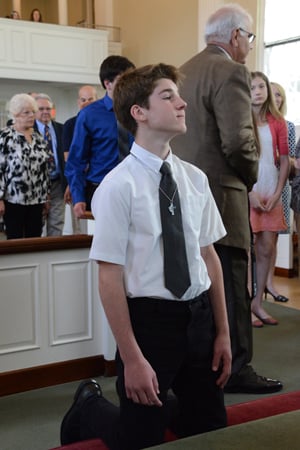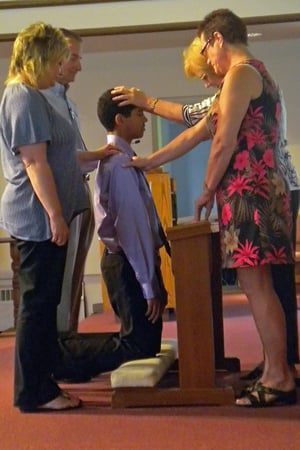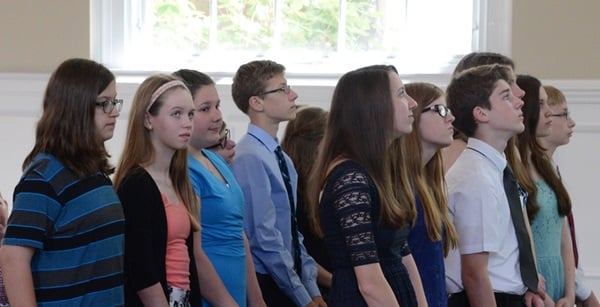Many lifelong United Methodists have fond memories of their confirmation class. Sometime during adolescence, they met with a group of their peers, some adult leaders, and their pastor. They may have gathered weekly in the church basement, during a youth Sunday school class, or maybe for a weekend retreat at a campground.
When the classes were complete, they then stood before their congregation, where the pastor and others put their hands on them while a blessing was said. Some then received a special lunch or a gift from their church.

Public profession of faith
Although confirmation is not a sacrament in The United Methodist Church, it is an important marker along our spiritual journeys.
At baptism, we are initiated into the new covenant in Jesus Christ and membership in the Church, Christ's body in the world. For many, this happens when they are very young.
We recognize children are members of their human families, but no one expects them to clean their rooms or empty the dishwasher until much later. In the same way, "baptized infants are members of the Church — the family of faith — but are not yet capable of sharing everything involved in membership," By Water and the Spirit, The United Methodist Church's official statement on baptism, teaches.
Confirmation is an opportunity to respond to the grace of God available to us, as acknowledged in baptism, and to promise to live as a person of faith. "What God offers us must be accepted in repentance and faith," This Is Your Baptismal Liturgy states. "Confirmation and reaffirmation are our responses of commitment, profession of faith, and rededication."
Service of confirmation
Because confirmation is so closely linked to baptism, the order for the service is contained within Baptismal Covenant I in the front of The United Methodist Hymnal.
Vows of a professing member
According to Paragraph 217 of the Book of Discipline, the vows of professing members, including confirmands, are:
- To renounce the spiritual forces of wickedness, reject the evil powers of the world, and repent of their sin;
- To accept the freedom and power God gives them to resist evil, injustice, and oppression;
- To confess Jesus Christ as Savior, put their whole trust in his grace, and promise to serve him as their Lord;
- To remain faithful members of Christ's holy church and serve as Christ's representatives in the world;
- To be loyal to Christ through The United Methodist Church and do all in their power to strengthen its ministries;
- To faithfully participate in its ministries by their prayers, their presence, their gifts, their service, and their witness;
- To receive and profess the Christian faith as contained in the Scriptures of the Old and New Testaments.
After the confirmands answer for themselves the same questions their parents and/or sponsors did when they were baptized, the pastor will say to the confirmand, "Remember your baptism and be thankful." This can cause some confusion for those baptized as infants too young to have memory of the occasion.
The intent is to remember that you are baptized. "It is not the particular event that you are remembering," clarifies the Rev. Taylor Burton-Edwards, director of worship resources with Discipleship Ministries of The United Methodist Church. "It is what has happened to you because of it — what God has done in you — that matters."
Typically, the confirmand then kneels before the pastor who, along with parents, sponsors, and others, lays hands on her head. The pastor speaks words that are nearly identical to those said during the laying on of hands following baptism, "The Holy Spirit work within you that having been born through water and the Spirit, you may live as a faithful disciple of Jesus Christ."
Finally, confirmands are asked to take the same vows of membership in The United Methodist Church and their local congregation that all who join are asked.
Because our journey in the Christian faith is not intended to be a solo venture, throughout the service there are places for the congregation to participate. In different parts of the service, they renew their baptism vows, profess their faith together with the confirmands, promise to do all in their power to support these newest professing members, and with them renew their covenant to be the body of Christ for the world.
Readiness is key
Parents and church leaders often ask what age is most appropriate for young people to participate in confirmation. The issue is not so much about a chronological age, but rather about one's readiness to assume the vows of professing membership.
"When you think about what's required to live out these vows with integrity," Burton-Edwards says, "it requires a measure of adult agency." At what age that happens varies among individuals and cultures.
"If you look at the earliest point at which we give adult responsibilities," Burton-Edwards explains of the culture in the U.S., "it's the driver's license." This might indicate that a good time for people in the U.S. to consider confirmation is about the age of 16. For others it might be sooner.
The ability to live into the vows is the key determining factor, not a particular birthday.

A renewed beginning
"Confirmation includes three aspects," This Is Your Baptismal Liturgy summarizes. "a) God confirms the divine promise to those who were too young to grasp what God was doing in their baptism, b) they respond by professing their own acceptance of the grace they have received and their own faith in Christ, c) the Church, as represented by this congregation, confirms the commitments they make."
Confirmation is not a destination. It is more of a way station, a place where we renew our commitment to the journey we have been traveling under the care of others.
"It is the first time that persons publicly declare their intention to live out the vows of the baptismal covenant," Burton-Edwards teaches. "It is not intended to be the last time. It's just that confirmation is the label we put on the first time."
It is also a time for a congregation to celebrate their young people's commitment to "live as a faithful disciple of Jesus Christ," and to renew their commitment to do the same.
*Joe Iovino works for UMC.org at United Methodist Communications. Contact him by email or at 615-312-3733.
This article was originally published October 23, 2015.





